
Features
Production
Research
Rock crusher helping to nurture potato land
helping to nurture potato land
February 28, 2008 By Kathy Birt
When it comes to harvesting potatoes, rocks can be a big-time headache. The pesky boulders and stones can cause damage to machinery, such as the potato planter and digger, which can lead to increased downtime and increased costs in production.
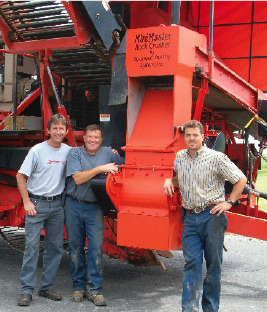 |
| The Mini-master Rock Crusher is the creation of Michel LeBlond of Syncropact Crushing Systems. The machine attaches directly to the potato harvester in place of the rock box, saving farmers’ time and effort. |
When it comes to harvesting potatoes, rocks can be a big-time headache. The pesky boulders and stones can cause damage to machinery, such as the potato planter and digger, which can lead to increased downtime and increased costs in production.
In the early 1990s in New Brunswick – a province where rock-infested soil is prevalent – a few potato farmers, an agronomist and an equipment marketer got together and decided to try rock-crushing equipment as a way to solve the rock problem. By crushing the rocks, they hoped to turn them into a soil health benefit.
Michel LeBlond was working for a farm machinery retail company when he heard a farmer enquire about attaching a crusher to a potato harvester.
"I was doing demonstrations of a rock crusher that was pulled by a tractor,” he recalls. “The crusher required a tractor that was equipped with creeper speed (very slow),” adding that system for crushing rocks was very time-consuming and expensive as the crusher’s hammer required frequent changing.
The idea of attaching a crusher to a harvester got LeBlond thinking and he began to tinker and experiment with developing just such a machine.
“It had been mentioned … that a rock crusher had been developed in Prince Edward Island,” says LeBlond. “But it could only crush sand stone and shale, which is an easily breakable type of rock.”
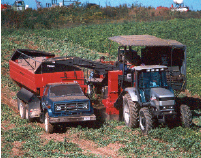 |
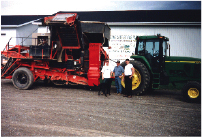 |
| The Mini-master Rock Crusher at work in the potato field of producer Kevin Taylor of Wilmot Farm. It’s been mounted onto a Thomas Harvester, Model TA 2054. | Potato producer Énoil Côté of Grand Falls, N.B., says his farm’s rock crusher was worth the cost. He can pass the harvester/crusher over his 300 acres of potatoes and have no rocks left. |
Over the winter of 1992-1993, Le-Blond designed a prototype and tested it in a gravel pit.
“At the time, my work was very busy, so I set it aside,” he says.
He didn’t look at it again until 1997.
Pulling the rock crusher off the shelf, LeBlond had to find a way to put his prototype into action for farmers. He fitted the crusher with a 45-hp diesel engine, mounted it onto the back of a rock picker and took it to Michaud Equipment, a potato equipment dealer in St-Andre, N.B. They tried the tractor-pulled, crusher-equipped rock picker in a field where rocks had been left in rows.
“Its performance was overwhelming,” he says.
The machine was then put to a bigger test at the farm of Yvon Ouellette of Ouellette Seed Farms in Drummond, N.B.
“We tested it in a field where rock piles had not been removed and put everyone of them through the crusher,” recalls LeBlond. “This proved that if the machine could do the work without breaking down, then it could perform well as an attachment to a potato harvester with (some) redesigning.”
With trials of the crusher all on video, LeBlond – who was now calling his company Syncropact Crushing Systems – proceeded to redesign the exterior of the crusher to fit potato harvesters while making it esthetically appealing at the same time.
“It is keeping customers happy,” he says.
One of those customers is Énoil Côté of Grand Falls, N.B., who bought his MiniMaster Rock Crusher in September 1998. He has done nine harvests with it since then. Côté can pass the harvester/crusher over his 300 acres of potatoes and have no rocks left.
“Rocks are very hard on farm machinery,” says Côté, adding that once harvest is completed, he must change the hammer attachment in the crusher, an expense of about $2,500.
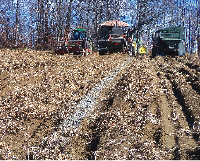 |
| Crushing rocks in the field can lead to improved potato quality. According to a study conducted in Carleton, N.B., the number of seriously damaged tubers fell from 38 per cent to 17 per cent after a rock crusher was used on the field. |
Despite this cost and the fact the harvester/crusher machine costs about $25,000, Côté says the piece of equipment has paid off for him.
“There is less damage to the potatoes now and less compaction, less soil erosion,” he says. “When I had to take out the rocks manually, soil was removed (from the field). Now there is no soil erosion.”
Côté believes the rocks are in the field for a reason and that crushing the rock provides a beneficial nutritional amendment to the soil.
“The idea behind the Mini-Master Rock Crusher was to be able to crush rocks directly on the harvester since rocks are already being collected and sorted by the harvester,” says LeBlond. By combining these jobs, he believes this could mean huge savings in time and effort.
How it works
The Mini-Master Rock crusher is mounted on the harvester in place of the rock box. As the harvester digs, it sorts out the rocks and supplies them to the crushing attachment. The crushed material then drops out under the crusher to the ground. The resulting crushed rocks are small enough – usually 1.25 inches or smaller in diameter – to pass through the harvester’s digger belt during subsequent harvests. Meanwhile, rocks that have been lifted by the frost or other ground-working machinery will travel the belt with the potatoes and be separated out by the
harvester for crushing.
In the past, collecting and disposing of rocks in the field required a tractor, a rock picker, an operator, fuel plus a loader and a truck, says LeBlond. It also took time. Excessive travel over the fields with all the equipment also led to negative effects on the soil, such as compaction and the formation of ruts where water could gather and washouts could form.
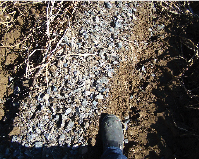 |
| Recent research from Agriculture and Agri-Food Canada shows that removing rocks and stones completely from fields significantly lowers water infiltration rates during rainfall and increases soil compaction. This, in turn, leads to increased surface runoff and soil erosion. Researchers are recommending farmers crush stones in the field as a way of minimizing theadverse effects of stone removal. |
According to Dr. Lien Chow, a researcher with Agriculture and Agri-Food Canada (AAFC) based at the Potato Research Centre in Fredericton, N.B., rocks can play an important role in protecting the soil from erosion and encouraging plant growth. He recently reported that studies conducted in New Brunswick show that removing rocks and stones completely from fields significantly lowers water infiltration rates during rainfall and increases soil compaction. This, in turn, leads to increased surface runoff and soil erosion.
It’s highly recommended that stones be crushed in the field as a way of minimizing the adverse effects of stone removal, stated Dr. Chow, adding it’s been found that the coarse fragments resting on the soil surface have the same effect as other mulching materials in protecting the soil against the impact of raindrops. The fragments have also been found to reduce soil loss and improve soil temperature and moisture, resulting in increased yields.
Crushing rocks in the field can also lead to improved potato quality. According to a study conducted in Carleton, N.B., the number of seriously damaged tubers fell from 38 per cent to 17 per cent after a rock crusher was used on the field.
Besides LeBlond’s rock crusher, Paul Fox of Double R Manufacturing, based in Bonshaw, P.E.I., manufactures and markets a rock crusher that is incorporated onto a potato harvester.
“I haven’t made or sold any in about six or seven years,” he admits, adding “The stone crushers work well and don’t break down, and anyone who needed one, got one.”
Fox estimates there are “dozens” of his rock crushers in use across P.E.I., while LeBlond says he has about 16 rock crushing units on potato harvesters within New Brunswick.
“It’s been more than 10 years since I introduced my product to potato growers,” says LeBlond. “It wasn’t easy. [But] I knew that my product was an asset growers needed [on the farm].”
He is considering developing a rock crusher that can be attached to a rock picker, making it possible to use the implement with other crops. ❦
Print this page